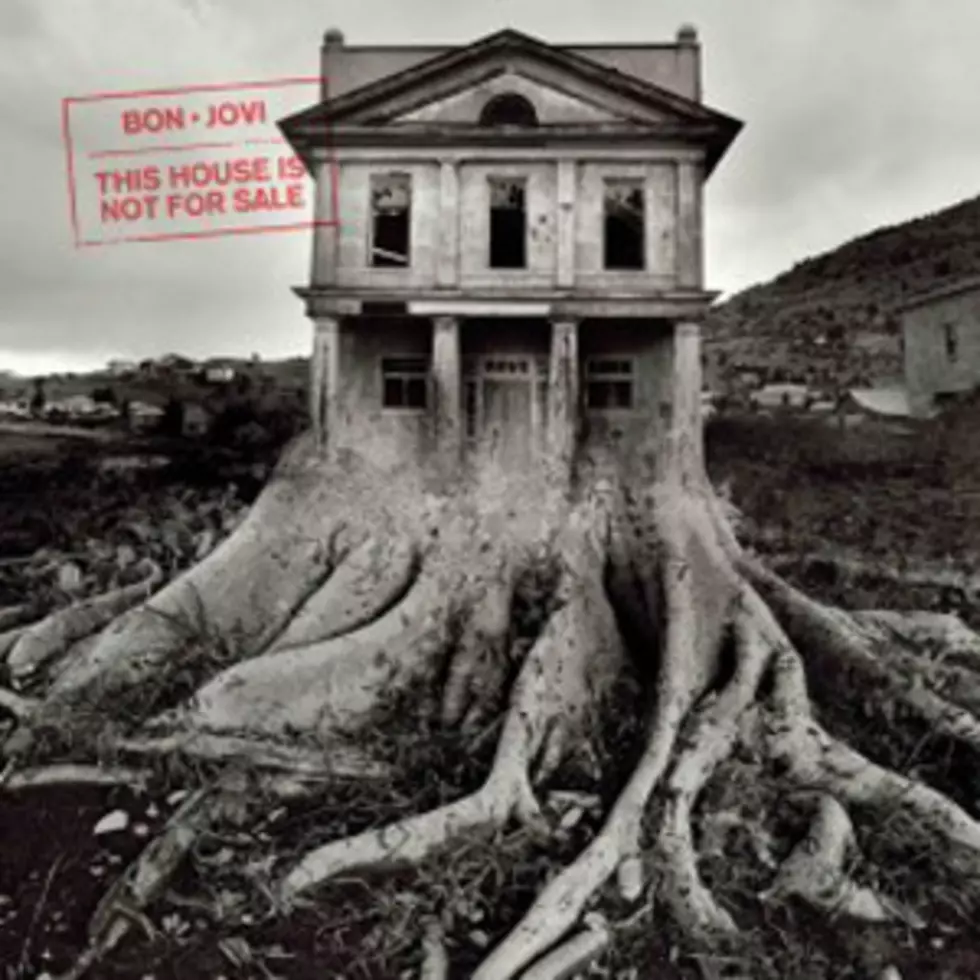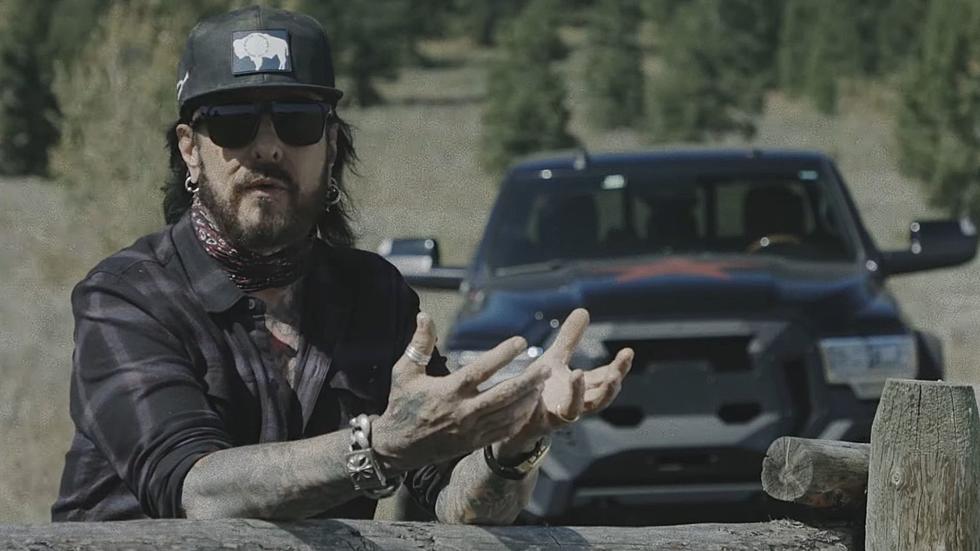
Bon Jovi, ‘This House Is Not for Sale': Album Review
For the better part of a decade, 1986-1996, Bon Jovi renovated their sound in ways for which no one has ever given them credit. At their best, they were a band that instilled a sense of drama on their recordings -- from the finger-pointing lament of “You Give Love a Bad Name” to the pop-metal tribal opening of “Lay Your Hands on Me” to the searing 10-minute social commentary “Dry County”, they were more driven than anyone could have imagined.
Then came the dividing point, “It’s My Life.” Bon Jovi’s career divides itself into pre- and post-“It’s My Life” eras. The song was a blessing for the band as it allowed it to remain relevant and, in pockets of the country, a stadium band. The flip side of this triumph was stationary musical growth over the next decade as they attempted to rewrite this song on every record. Even when they claimed to make a musical departure with the Nashville inspired Lost Highway, it was ultimately a Bon Jovi record beneath the surface.
Since Bon Jovi released What About Now in 2013, the band’s world turned upside down. Guitarist Richie Sambora left the band under circumstances still not clear, drummer Tico Torres had abdomen surgery in the middle of the tour and Jon Bon Jovi left music behind to focus his efforts on becoming a NFL owner, only to lose a bid for the Buffalo Bills franchise. Then, in 2015, the band’s first performance scheduled for China was canceled and it left its longtime record company with a contractually obligated finger pointing Burning Bridges (they have since reunited with one of the company's subsidiary labels). One would hope the culmination of these events would find their way onto the band’s 13th record, This House Is Not for Sale.
Listening to This House Is Not for Sale, it becomes apparent Sambora had not been the go-to collaborator for more than a decade; instead, the one-dimensional and radio-ready sounds of John Shanks became a driving force. Sambora always had a way of adding nuanced soul, blues and classic rock into Bon Jovi that distinguished the band from its peers. While many hard-rock guitarists in the late '80s worshipped Eddie Van Halen, Sambora bowed down to earlier legends like Jimmy Page, Johnny Winter, Brian May, George Harrison, Eric Clapton and Duane Allman. You could argue one of the reasons Bon Jovi survived the grunge apocalypse was due to Sambora’s input, which helped hoist the band during a bumpy period. His absence on This House Is Not for Sale is notable.
When Bon Jovi emerged in the fall of 2005 with their ninth record, Have a Nice Day, it was the sound of a band refreshed and invigorated. Their previous effort, Bounce, was the first to not reach platinum status and was viewed as a heavy-handed response to the events of 9/11. The band hired John Shanks to produce Have a Nice Day, and the initial reaction to the record was positive, as Sambora’s guitar rumbled across the album’s 12 songs with the band following in tight formation. “Who Says You Can’t Go Home” hit No. 1 on the country singles chart, giving Bon Jovi the distinction of the first rock band to ever accomplish this feat. Over the next 11 years, Bon Jovi would occasionally flirt with other producers, notably Howard Benson and Dann Huff, but Shanks has become their go-to-guy. For This House Is Not for Sale, Shanks doesn’t just produce; he also co-wrote and played guitar on the majority of the tracks with touring guitarist Phil X filling in on a handful.
Over the course of the dozen songs (with an additional six found on various deluxe configurations), the band mines its previous Shanks collaborations on a record that feels like a pseudo greatest hits of the Shanks era. Housed within are arm-waving choruses, easy-on-the-ears melodies and modern country songs. The majority of This House Is Not for Sale taps into their post-2000 formula of verse-chorus-verse-chorus-bridge-chorus with half of the album clocking in under the magical radio-ready four-minute mark.
The album’s title cut opens the record with a raucous roar of guitars that sounds eerily reminiscent of 2005's “Have a Nice Day”, which was a title cut, lead single, album opener and produced by Shanks. Without Sambora in the fold, one would assume the band would up its game to say something new, take a musical u-turn or, at the very least, shred away the layers of production that has hindered much of its post-2002 work. One listen to this record and it's like time has stood still for the better part of the past decade.
The country-influenced “Scars on My Guitar”, which was co-written by Brett James (best known for Carrie Underwood’s hit “Jesus, Take the Wheel”), trips over itself with obstinate lyrics where the narrator professes his love for a guitar that is always there for him (“She’s the one I hold where I hold, when there’s no one to hold onto”). The band previously wrote about the songwriting process on These Days' "My Guitar Lies Bleeding in My Arms," which is much better. On “New Year’s Day”, one of the albums better songs, Bon Jovi croons, “I'm singing hallelujah /Amen, the angels say/ Let’s hope tomorrow finds us / It's New Year's Day.” While U2 don't have a patent on the title, one wonders if the band deliberately fell into a trap capturing much of the mainstream criticism about its often derivative nature. Jon Bon Jovi covered Leonard Cohen’s “Hallelujah” in concert in 2007-08, and it served as a minor inspiration on “Learn to Love” in 2009. In 2013, he gave us “Amen,” and if that is not enough, he had a bit role in Garry Marshall’s rom-com “New Year’s Eve.” Do you see a pattern? The band has continually returned to the same barren well for inspiration, and it becomes more glaring with every album casting a shadow over its underrated first two decades.
They paint all of the songs on This House Is Not for Sale with broad brushstrokes that aim for universality. Overlooking the track listing for the record, contemporaries have had many of the same song titles: “This House Is Not for Sale” (Ryan Adams), “Reunion” (Indigo Girls), “Roller Coaster” (Bleachers), “God Bless This Mess” (Sheryl Crow). It's hard to determine if they consciously lifted these titles or if they are merely not scratching beneath the surface of their writing.
The album’s most distinctive moments don't feel fully executed, with a majority of the better cuts only available on the extended version. The lovely noir guitar of “Labor of Love” echoes shades of Chris Isaak’s “Wicked Game,” but does not fulfill on its promising start. “Real Love” (not to be confessed with the Ed TV soundtrack contribution “Real Life”) is a restrained piano-driven ballad. And “I Will Drive You Home” captures self-possessed emotions buried in an evocative production with layered backing vocals that makes you sit back and realize that it is possibly the most exploratory song the band has ever recorded with Shanks.
The hopeful theater of believing-in-yourself gets old five songs in. "Roller Coaster" has a few too many wooh-oh-ohs for its own good, while “Born Again Tomorrow” and “Knockout” are paint-by-numbers songs, with the latter including the eye-rolling lyrics of "I'll be giving you the finger, sticking out my chin." These are all themes the band has continually tapped into over the past decade, on the less-than-subtle “Bounce” and “Because We Can,” neither among their stoutest material.
Shanks is a producer who has done some good work with Crow, Melissa Etheridge and Michelle Branch, but with Bon Jovi you get the sense he's afraid to rock the boat at all, delivering a safe sound that will play well to masses to crowds without having an enduring impact. The production is conformist to the point where the past decade of songs are largely indistinguishable and only notable to the die-hard fan base. There's comfort with Shanks in the producer’s seat. Seeing him now onstage with the band, one has to wonder if he's a producer willing to rock the boat, forcing them to go back to the drawing board in the honor of art when there is a budget to adhere to and a tour to be booked.
Bon Jovi deserve credit to put a focus on creating new music in an age when most acts go on never-ending tours and deliver a new studio record once a decade. The problem with This House Is Not for Sale is that it offers us a slightly modified version of a better band that even then wasn't fulfilling the promise of its potential. The songs are big and boisterous without breathing life into the characters. The overriding metaphor of the album is an impenetrable house that still stands overlooking the past with an emphasis on the future. Band members may come and go from that house, fluctuating the chemistry of the family, but the house is Jon Bon Jovi’s way of telling the world he is here to stay and isn't planning to ride off quietly into the sunset anytime soon with or without former inhabitants of the four walls. The only thing he seems to have forgotten is that a house does not make a home.
Bon Jovi Albums Ranked Worst to Best
More From 98.3 The Snake










